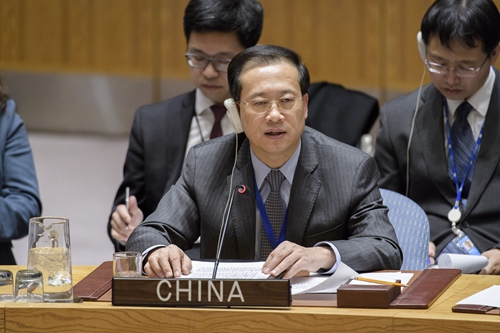| Statement by Ambassador MA Zhaoxu at the Security Council Briefing on Threats to International Peace and Security Caused by Terrorist Acts |
| 2018-02-13 06:54 |
|
China appreciates the Kuwaiti initiative to convene this briefing on counter-terrorism and the protection of critical infrastructure against terrorist attacks. The delegation of China thanks Ambassador Meza-Cuadra for his briefing. Terrorism is the common enemy of all humankind. Faced with the threats of terrorism, all countries have a shared destiny. The international community should embrace the concept of a community with a shared future, closely follow new trends and characteristics in the evolution of such threats, enhance cooperation and jointly respond to terrorist threats. First of all, in the face of all forms of terrorist threats, the international community should uphold a unified standard and enhance counter-terrorism synergy. All countries should adopt a zero-tolerance policy without differentiation, regardless of terrorist locations, justifications, target countries or tactics. Terrorists must be met with resolute measures. International counter-terrorism efforts must fully respect the sovereignty of countries concerned. Affected countries should assume the primary responsibility to combat terrorism. International cooperation in the field of counter-terrorism must be in keeping with the purposes and principles of Charter of the United Nations and promote the leading role of the United Nations and the Security Council. Secondly, the international community should jointly respond to and address the root causes that breed terrorism. The international community should help Members States of the United Nations to achieve socioeconomic development, alleviate and eradicate poverty and conduct dialogue on an equal footing among civilizations and religions. We should refrain from linking terrorism with any specific ethnicity or religion, build a new form of international relations and build a community with a shared future for humankind. Thirdly, all countries must take concrete measures to stop the movement of terrorist fighters and curb the spread of terrorist and extremist ideologies. Currently, a major challenge is the movement and return of terrorist fighters who have launched many attacks on infrastructure in their countries of origin, transit and destination. All countries should enhance border control and enforcement cooperation. The counter-terrorism bodies of the United Nations and relevant international organizations should play an important role in that effort. On the basis of respecting the sovereignty of Member States, the United Nations and relevant international bodies must respond to the specific needs of Member States and enhance the capacity-building of those countries and their ability to respond to the movement of terrorist fighters. The international community should also follow the new trends and evolution of the terrorist threat and scale up efforts to counter the use of the internet for the spread of estremist ideologies and the commission of terrorist attacks. Fourthly, concrete measures should be adopted to implement Council resolution 2341 (2017) and other relevant resolutions so as to protect critical infrastructure from terrorist attacks. Member States should implement relevant Council resolutions, identify relevant security policies and take concrete measures with regard to any potential terrorist attack on critical infrastructure as a high-risk factor, as well as establish early-warning and emergency-response mechanisms. All countries should shoulder the responsibility of ensuring the safety and security of their own infrastructure, enhance domestic legislation and bring to justice perpetrators of terrorist attacks on infrastructure. The international community should enhance international cooperation in the field of protecting critical infrastructure and help developing countries to scale up their capacity-building. Over the past few years, the violent terrorist elements in eastern Turkistan — represented by the Eastern Turkistan Islamic Movement (ETIM) — have planned and carried out a number of terrorist attacks in China. They have also posed a serious threat to countries in the Middle East and Central Asia. Fighting the violent terrorist forces of ETIM should be part of international counter-terrorism efforts. Such forces should be met with resolute measures. As a very important member joining the international counter-terrorism efforts, China has actively participated in recent years in multilateral cooperation mechanisms, such as the United Nations and the Shanghai Cooperation Organization, and have made important contribution to international counterterrorism efforts. Beginning in 2017 and for the next five years, China will support INTERPOL in carrying out three joint global initiatives annually to combat terrorism and organized cybercrime. China supports the Counter-Terrorism Committee and its Executive Directorate and the 1267 Committee to enhance cooperation with the United Nations Office of Counter-Terrorism, and will provide counter-terrorism supplies and capacity-building assistance to developing countries, within the scope of their capabilities. China stands ready to work together with all countries to jointly respond to the threat of terrorism and to maintain peace and stability. |
| |||||||||||||
| |||||||||||||
